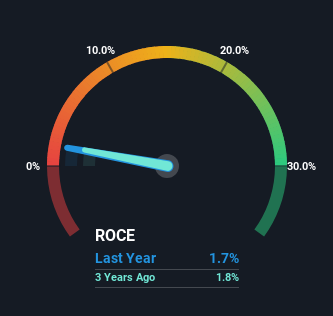- Japan
- /
- Wireless Telecom
- /
- TSE:9984
Returns On Capital Signal Difficult Times Ahead For SoftBank Group (TSE:9984)

When it comes to investing, there are some useful financial metrics that can warn us when a business is potentially in trouble. Businesses in decline often have two underlying trends, firstly, a declining return on capital employed (ROCE) and a declining base of capital employed. This indicates the company is producing less profit from its investments and its total assets are decreasing. So after glancing at the trends within SoftBank Group (TSE:9984), we weren't too hopeful.
Return On Capital Employed (ROCE): What Is It?
Just to clarify if you're unsure, ROCE is a metric for evaluating how much pre-tax income (in percentage terms) a company earns on the capital invested in its business. Analysts use this formula to calculate it for SoftBank Group:
Return on Capital Employed = Earnings Before Interest and Tax (EBIT) ÷ (Total Assets - Current Liabilities)
0.017 = JP¥577b ÷ (JP¥48t - JP¥14t) (Based on the trailing twelve months to June 2024).
Thus, SoftBank Group has an ROCE of 1.7%. Ultimately, that's a low return and it under-performs the Wireless Telecom industry average of 11%.
See our latest analysis for SoftBank Group

Above you can see how the current ROCE for SoftBank Group compares to its prior returns on capital, but there's only so much you can tell from the past. If you'd like, you can check out the forecasts from the analysts covering SoftBank Group for free.
What Does the ROCE Trend For SoftBank Group Tell Us?
There is reason to be cautious about SoftBank Group, given the returns are trending downwards. Unfortunately the returns on capital have diminished from the 3.1% that they were earning five years ago. On top of that, it's worth noting that the amount of capital employed within the business has remained relatively steady. Since returns are falling and the business has the same amount of assets employed, this can suggest it's a mature business that hasn't had much growth in the last five years. So because these trends aren't typically conducive to creating a multi-bagger, we wouldn't hold our breath on SoftBank Group becoming one if things continue as they have.
Our Take On SoftBank Group's ROCE
In summary, it's unfortunate that SoftBank Group is generating lower returns from the same amount of capital. But investors must be expecting an improvement of sorts because over the last five yearsthe stock has delivered a respectable 87% return. In any case, the current underlying trends don't bode well for long term performance so unless they reverse, we'd start looking elsewhere.
One final note, you should learn about the 4 warning signs we've spotted with SoftBank Group (including 1 which is significant) .
While SoftBank Group isn't earning the highest return, check out this free list of companies that are earning high returns on equity with solid balance sheets.
New: Manage All Your Stock Portfolios in One Place
We've created the ultimate portfolio companion for stock investors, and it's free.
• Connect an unlimited number of Portfolios and see your total in one currency
• Be alerted to new Warning Signs or Risks via email or mobile
• Track the Fair Value of your stocks
Have feedback on this article? Concerned about the content? Get in touch with us directly. Alternatively, email editorial-team (at) simplywallst.com.
This article by Simply Wall St is general in nature. We provide commentary based on historical data and analyst forecasts only using an unbiased methodology and our articles are not intended to be financial advice. It does not constitute a recommendation to buy or sell any stock, and does not take account of your objectives, or your financial situation. We aim to bring you long-term focused analysis driven by fundamental data. Note that our analysis may not factor in the latest price-sensitive company announcements or qualitative material. Simply Wall St has no position in any stocks mentioned.
About TSE:9984
SoftBank Group
Provides telecommunication services in Japan and internationally.
Low and slightly overvalued.
Similar Companies
Market Insights
Community Narratives


